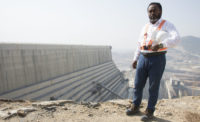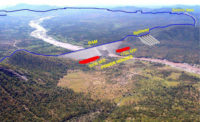Egypt, Ethiopia and Sudan's tripartite talks, related to the construction of the $4.8-billion Grand Ethiopian Renaissance Dam on the Blue Nile, collapsed in November after water ministers from the three countries failed to agree on how to proceed with findings and recommendations by French firms BRL and Artelia on the impact of the project on Nile River waters.
The French firms were picked in 2015 to study the hydrological, environmental and economic impact of the 6,450-MW dam, the largest in Africa. Italian contractor Salini Impregilo is constructing the dam, which lies more than 700 kilometers northwest of the Ethiopian capital, Addis Ababa.
The dam—1,800 meters long and 155 m high, with volume capacity of 10,200,000 cu m—is said to be more than 60% complete. The project is expected to transform Ethiopia into one of sub-Saharan Africa's electricity exporters. One in three people in the sub-Sahara lack access to electricity, according to the U.S. Agency for International Development.
Egypt has expressed concern that construction of the dam and filling the 74-million-cu-m reservoir in three years could negatively impact its share of the 55.5 billion cu m of Nile River water under the 1929 agreement between the North Africa country and the U.K., which was its colonial power at the time.
The Blue Nile, on which the dam sits, contributes 85% of the Nile River water. Sudan has been allocated 18.5 billion cu m of the water since 1959, when it signed a deal with Egypt that gave the two countries an estimated 87% of the Nile River's estimated annual 84 billion cu m of water.
After the two-day 17th Annual Tripartite National Technical Committee in Cairo, Egyptian Minister of Water and Irrigation Mohamed Abdel Aty was quoted as saying, "Egypt is worried about the failure of the technical negotiations because it jeopardizes the future of cooperation between Sudan and Ethiopia and their ability to agree on the Renaissance Dam and to avoid its potential risks while preserving Egypt's water security."
Although Aty's ministry did not respond to emails on the findings' disputed portions and BRL's and Artelia's recommendations, Egyptian media on Nov. 15 said the Cairo talks focused on how long it will take to fill GERD's reservoir and how much of the Blue Nile River water would be used in electricity generation from the new hydroelectric power project.
Fresh talks are scheduled to take place before the end of the year to avert a full-blown political and security crisis after Egyptian President Abdel-Fattah al-Sisi on Nov. 18 was quoted as saying, "No one can touch Egypt's share of Nile water," adding that the share is "a matter of life or death" for Egypt.
Despite the strong warning, Ethiopia Minister of Irrigation, Water and Electricity Seleshi Bekele in mid-November told Al Jazeera that the dam's construction "has never stopped, and will never stop, until the project is completed."
Bekele added, "We are not concerned by what Egypt thinks—Ethiopia is committed to benefiting from its water resources without causing harm to anyone."



Post a comment to this article
Report Abusive Comment